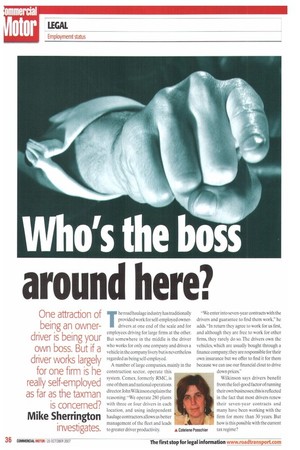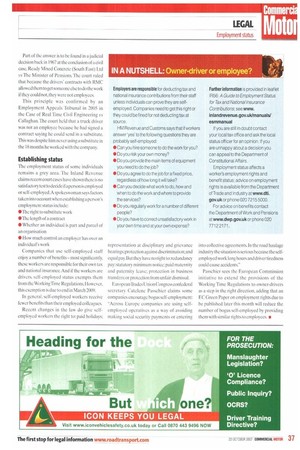aro nd here?
Page 36

Page 37

If you've noticed an error in this article please click here to report it so we can fix it.
The road haulage industry has traditionally provided work for self-employed ownerdrivers at one end of the scale and for employees driving for large firms at the other. But somewhere in the middle is the driver who works for only one company and drives a vehicle in the company livery but is nevertheless regarded as being self-employed.
A number of large companies, mainly in the construction sector, operate this system. Cemex. formerly AMC, is one of them and national operations directorkhnWilkinson explains the reasoning: "We operate 280 plants with three or four drivers in each location, and using independent haulage contractors allows us better management of the fleet and leads to greater driver productivity. "We enter into seven-year contracts with the drivers and guarantee to find them work," he adds. "In return they agree to work for us first, and although they are free to work for other firms, they rarely do so. The drivers own the vehicles, which are usually bought through a finance company; they are responsible for their own insurance but we offer to find it for them because we can use our financial clout to drive down prices."
Wilkinson says drivers benefit from the feel-good factor of running their own businesses; this is reflected in the fact that most drivers renew their seven-year contracts and many have been working with the firm for more than 30 years. But how is this possible with the current tax regime? Part of the answer is to be found in a judicial decision back in I 967 at the conclusion of a civil case. Ready Mixed Concrete (South East) Ltd vs The Minister of Pensions. The court ruled that because the drivers' contracts with RMC allowed them to get someone else to do the work if they could not, they were not employees.
This principle was confirmed by an Employment Appeals Tribunal in 2005 in the Case of Real Time Civil Engineering vs Callaghan. The court held that a truck driver was not an employee because he had signed a contract saying he could send in a substitute. This was despite him never using a substitute in the 18 months he worked with the company.
Establishing status
The employment status of some individuals remains a grey area. The Inland Revenue claims recent court cases have shown there is no satisfactory test to decide if a person is employed or self-employed. A spokeswoman says factors taken into account when establishing a person's employment status include: • The right to substitute work • The length of a contract • Whether an individual is part and parcel of an organisation • How much control an employer has over an individual's work Companies that use self-employed staff enjoy a number of benefits — most significantly, these workers are responsible for their own tax and national insurance. And if the workers are drivers, self-employed status exempts them from the WorkingTime Regulations. However, this exemption is due to end in March 2009.
In general, self-employed workers receive fewer benefits than their employed colleagues.
Recent changes in the law do give selfemployed workers the right to: paid holidays; representation at disciplinary and grievance beatings: protection against diserimination;and equal pay. But they have no right to: redundancy pay: statutory minimum notice; paid maternity and paternity leave; protection in business transfers; or protection from unfair dismissal.
EuropeanTrades Union Congress confederal secretary Catelene Passchier claims some companies encourage bogus self-employment: "Across Europe companies are using selfemployed operatives as a way of avoiding making social security payments or entering into collective agreements. In the road haulage industry the situation is serious because the selfemployed work long hours and driver tiredness could cause accidents."
Passchier sees the European Commission initiative to extend the provisions of the Working Time Regulations to owner-drivers as a step in the right direction, adding that an EC Green Paper on employment rights due to he published later this month will reduce the number of bogus self-employed by providing them with similar rights to employees, •


























































































































































































